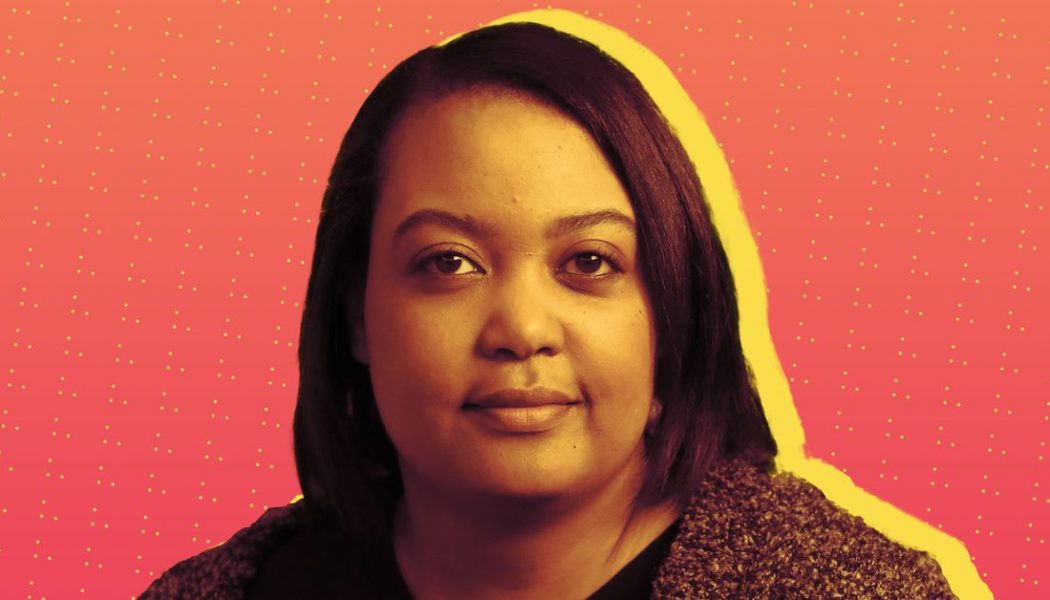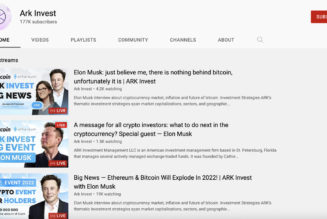
One of the things I’m excited to do on Decoder is talk to people who are shaking up industries and trying new things. My guest on today’s episode is known for that: Arlan Hamilton is the founder and managing partner of venture capital firm Backstage Capital.
Arlan came to the VC world in a unique way: she started Backstage without formal education or experience in investing, and her firm focuses on funding startups run by people of color, women, and the LGBTQ community. Backstage has done 160 deals so far, with investments in everything from online beauty retailers to satellite internet companies.
I’m especially excited to talk to Arlan on Decoder because, as of today, Backstage is going even broader: it’s opening a new fund that anyone can invest in to allow more regular people access to VC-style investing as part of their portfolios. This is one of the first funds of this kind under a new Securities and Exchange Commission rule called Reg CF, or Regulation Crowdfunding. I talked to Arlan about that and about the explosion of regular people investing using tools like Robinhood.
And of course, we talked about the day-to-day decisions she makes as a VC and where she thinks the opportunities in tech lie. Pay attention to her answer about competing with the tech giants. She told me she doesn’t worry about them at all, which is a perspective I hadn’t heard as clearly before and something I’ve been thinking about ever since.
Here we go.
This transcript has been lightly edited for clarity.
Arlan Hamilton, you’re the founder and managing partner of Backstage Capital. Welcome to Decoder.
Thank you so much for having me here.
I have been wanting to talk to you for a long time. I feel like you’ve made a lot of waves in the venture world. The Verge and the Vergecast are very consumer-oriented products. [On] Decoder, we want to talk more about business. I finally have this excuse to come and talk to investors like you about the business side of tech that obviously drives so many of the outcomes that we see on the consumer side.
Let’s start at just the start. Backstage is a VC fund. You’re focused on underrepresented founders. It seems like there’s an endless reckoning in tech about representation. The situation at Google AI with Timnit Gebru just happened, where the most prominent Black researcher in AI tech was let go by Google, because it seems her research was against Google’s business. There’s just a lot of that happening. Let’s pull it back because I think that stuff is interesting to talk about. I want to talk about the business, as a whole, of tech. How did you end up as a VC? Because that backstory informs a lot of what happens next.
I never thought I would become a venture capitalist. I don’t think I knew what one was 10 years ago, but around then is when I started learning more and more about the tech ecosystem and about investors, really through people like Ellen DeGeneres, Justin Bieber, Ashton Kutcher and Troy Carter, who were these celebrities or their management, making these small investments in a place called Silicon Valley about a decade ago. I was in Texas. I had worked my way up on the production side of live concerts and tours, and which had been a lifelong dream. I was paying some attention to some of these players and was always curious about what’s going on. I noticed their investments, I might’ve seen an interview or two where they mentioned it, and saw some stickers on Ashton’s laptop. I was just so curious as to why those people, who I thought had really exciting lives, would be interested in something like a three-person team out of a garage.
Then I started to understand that those three-person garage teams, just like garage bands, could go on to become something much bigger and have a broader impact in the world. I just became semi-obsessed with the world of startups. The original idea was that I was going to start my own company. I wanted to research everything I could so that I could be prepared to talk to investors, other stakeholders, and customers. I like to be prepared. It was in that research in 2011 or so, that I first came across these statistics, that 90 percent plus of venture funding and angel funding goes to white men in six cities in the country. I was just blown away by it because white men make up one-third or so of the country.
Almost immediately, it became clear to me that I could probably hack my way into the funding to start a successful tech company, but it would be a very lonely road. It wouldn’t be fulfilling because so many others were going to be left out. So I changed my course. Then it started drawing me more towards what I consider my calling.
I ask everybody for their decision-making frameworks when they come onto the show. You make a very specific and particular kind of decision as an investor. You’re saying, this is worth some money. Your idea, and your company is worth some money, and I’m going to give it to you and maybe I’ll give you some help along the way. Then you’re going to come back and give me some more money. That’s the fundamental of that transaction.
That’s the gist of it.
That’s a very particular kind of decision. Given what you’ve just said about the structure of the industry, how do you make decisions?
A lot has happened in between those two points. I think people still believe that I’m just looking at someone’s profile. If you’re a Black founder, you walk through the door, I write a check for you. But I’m looking at a few different things. It’s essentially, going back to the root of everything, which is, what is this? What are these founders working on? What’s the potential of this company? My main job is to make money for myself, my team, and our investors. That’s my job. I believe that I will fulfill that and be able to do that by looking at companies the way that I look at them, which starts with, who are these founders?
What brought them here? What have they been able to do thus far with the limited resources they likely have at this point? What is the potential of that company, if it were to do well? I think about people like Sam Altman at Y Combinator, who often asks, what if it does work? What sort of impact does that have financially and socially? What has changed since I launched officially in 2015, is that I’ve seen almost 10,000 companies now. I’ve invested in, along with my team, 160-plus companies. Now — and I’ve turned 40 — I’m looking at things from the lens of what would take me a decade or more to do myself.
If it would take me less than a decade to do, I’m probably not going to be as interested in it. But if it would take me more than a decade, that means that if I invest in you, I get to live longer. I get to live deeper, fuller, and vicariously through you. To me, that’s really become a part of the lens and the landscape of what we do.
We’re talking on the day after I turned 40. Now I think I have to really rethink a lot of things, based on that answer.
Happy belated.
I’m going to have to emotionally process turning 40 for a longer time.
I love getting older. I love it. It’s just like, “We’re here, we’re here, we’re here.” It’s so great.
Inside of that decision-making framework you’re talking about, which is, okay, you control some capital. You’re going to give it to a team. They’re going to succeed on a project that has a long time frame, and that will make your life richer. Inside of that decision-making framework, there’s a million sub-decisions, I assume.
Of course. Yeah.
How do you approach those?
Well, first of all, with an understanding that most of venture is risky. It’s a highly, highly risky asset class, and most companies “fail”. I don’t know if I love that word. Most companies are not going to make it. You can guess, and you can hope, and you can add onto what they’re working on, but going into it, knowing that risk.
It goes back to, what have they been able to accomplish? Maybe they didn’t have a lot of money and maybe they don’t have a lot of revenue yet, but they might have thousands of people waiting for this product to be made. If we only hand them $100,000, is that possible for it to come to light? Do they have some really interesting backgrounds? Again, it doesn’t have to be a fancy school, or a big-name company, but do you have something that feeds into and speaks to the founder-product fit? Other investors have used phrases, like do you have a moat or do you have an unfair advantage, those types of things. It’s in that same vein. It’s what makes your profile, story, and the appetite for your particular company special. What about that background tells me that you’re going to wake up every single day and be like, “I am.” It’s a pattern matching their background with the willingness to fight for this every single day, through what will be mostly very tough days.
That’s who you give the money to, the founders and companies. Where does your money come from?
Well, our money comes from investors. They’re called limited partners or LPs. Historically, in most funds, they come from high net worth individuals, family offices, endowments, pension funds, depending on, the larger and larger the funds get. Historically our money has come from accredited angel investors, the independently wealthy, including Mark Cuban, who has put in half of our assets under management in the past. He doesn’t like to invest in other people’s funds because he has so much fun investing directly, but he did for us.
Mark was our first guest on this show. He was very clear that he has fun.
He has a lot of fun and he won’t do it if he’s not having fun. I don’t think he likes to mess around. He takes fun very seriously, I think.
You were going to break some news on Decoder today. What’s the news?
As of today, anyone can invest in Backstage Capital and have a stake in the umbrella company of Backstage, which means you have the same access as an investor. For the first time, we’re able to offer this to anyone, even those who are not considered accredited under the SEC regulations and those who are not in the United States. There are certain phrases I can’t say. I can dance around it, but I’ve been saying — this is just my opinion — it’s almost like having an IPO for Backstage. I think it is as close as you can get, without the real thing happening. Someone can invest for as little as $100 and have a piece of Backstage.
We’ve invested in 160 companies to date. We will invest in several more, over the next few years. When those companies have some sort of exit or liquidity event, meaning they sell to another company, IPO, or we decide they’ve grown enough that we’re going to cash out. That money goes back into the pot of the original dollars. Once we make all that original money back, we start making profit off of that. That’s where venture capitalists make their real money. Before we partnered with Republic and made this something public, all of that profit was just going to a few people, meaning myself and my team, the partners at Backstage and a few other select rich investors. Now, that windfall goes back to the crowd. Anyone who signs up for as little as $100 will see some of that profit. It’s been so exciting to partner with Republic on it because we share so many of the same values, and have a shared vision of what the future looks like.
One of the historic problems of venture capital is it’s often from a small group of VCs. They’re going to flood the market with money and they do have some big institutional investors, but it’s not very democratic. It’s not open. This seems like a push towards being open, but I’m still curious about the mechanics of it.
So I give you 100 bucks, when do I see $101 back?
This is all speculative, but we might raise a $60 million fund in 2022, and then a $200 million fund in 2025 or something like that. And we also have SPVs, which are special purpose vehicles, where we invest one company at a time.
So over the next decade, let’s say we have half a billion dollars under management. And this is, again, speculative because so much of how I talk about this is regulated. But let’s say over a decade, we double that amount for our limited partners. The way our structure is, we would see profit off of that. After we put back the $500 million, we would see profit off of that second $500 million because we doubled it. So we would see $100-150 million in profit off of that.
Well, we’re now sharing that. Like I said before, it’s a very risky asset class, and it’s also very illiquid. So for several years, you may not see anything except your own money coming back. But over time, as these companies exit, and we get that waterfall from them, you’ll start to see the $101 and the $105, and it could go up quite substantially. I don’t know if I can say much more beyond that, but that’s the point.
We have so many companies in our portfolio who we might’ve put $25,000 in, but now they’re raising $20 million or $30 million, and we own X amount of their company. Let’s say they go on in a couple of years to sell for half a billion dollars. Because we were in so early, we own a lot more than you would think we own.
There’s a lot of information on the campaign page and I encourage everyone to read it very carefully. If you can, have someone else look at it like a financial adviser or a legal adviser. But we try to make it very clear on the site that it’s a speculative, long, risky play, but if it does well, it pays out. It’s something that you want to hold, but you’ll see dividends on a yearly basis.
One thing that I think is interesting about younger culture right now is the rise of apps like Robinhood. For some reason, I fall into a TikTok hole of kids investing in Tesla. It’s wild. It seems like there’s a rising class of people who are way more interested in investing and making money work for them in alternative ways other than just spending it on fancy cars. How do you think this plays into the sort of culture that is being shaped by Robinhood and people wanting to be more investors?
I think it’s going to go in a couple of directions. I get so excited because I instantly thought of two people. I thought of my mother, who is 71, and I thought of my brother who is a few years younger than I am and has children who are teenagers.
My mother’s first official investment in a company was on [private investing platform] Republic, before we even knew we were going to be partnering with them. She put $500 into a deal after we went over it. And now, at 71 she has a piece of a company and a portfolio. I just think that’s so cool because she does public markets, but this is something where she can see their updates and know who’s behind it. She can wield her money to have the sort of impact she wants to have.
And then on the younger side, I’ve been around so many newly wealthy families where people who are like 16 to 30 are the ones steering that capital towards sustainability and social impact. Not only divesting their family’s capital, but really pointing it in a very distinct direction.
This kind of speaks to the people who like to diversify their assets in general, it’s one more thing you can have in your portfolio at a relatively small amount. It’s also something that you know is going to have an impact because we invest in underrepresented, underestimated founders. I say our portfolio is the most diverse portfolio in all of venture. People can come at me and challenge that, but I still haven’t seen a more diverse portfolio. It’s also the things the companies are working on themselves. They’re working on sustainability, climate change, distinct health products, fintech products, to help democratize so many other industries.
I also think it’s just fun. When I put in $1,000 or $100 into a stock, I want to see how it does. And you should never put all of your money into one thing. But I think it plays into the gamification of things. I think you have, by and large, a very conscious demographic coming up. I’m going to knock on wood just in case, but I feel very confident in growing old because of the young people I see who I think are just amazing. They’re so thoughtful these days, by and large.
Let me put some edge on that. I feel like the other thing that’s happening next to Robinhood is a bunch of young people are like, “I’m putting all my money in Bitcoin.”
That is a different class of investment. And there’s good reasons for doing it, and there’s good reasons for not doing it. But it does feel like Bitcoin and crypto in general has this promise of endless return. There is some risk in it, and I think people understand the risk. It’s obviously very volatile. But overall, they feel like it’s not risky because if you spent $100 in Bitcoin in 2015, you’d be a millionaire.
And so, when you’ve got a class of new investors who are interested in things like VC, who see the big exits of companies that are trying to change the world, who have only really experienced a market that goes up, and look at something like Bitcoin where it’s like “instant millions.” It feels like a lotto ticket. How do you think about investors, particularly young investors, managing risk? We don’t like the word, but a lot of these companies are going to fail.
There is a possibility that Backstage doesn’t do well at all and everything that I have guessed and envisioned doesn’t come true. And that’s why I say, all venture investing is so risky. All of it can go to zero. Every company in our portfolio, again, knock wood, could go to zero. But we have diversified our portfolio so much that we have mitigated against that risk, in my opinion.
Like I said, it’s my job to get up every morning and see how to make money for our stakeholders, and myself. We’re highly incentivized to do that. We’ve invested in 160 companies, but we’ve also seen about 8,000 or so companies, so we invest in about 2 percent of what we see. We’re very, very structured and disciplined when it comes to the investments that we make.
So I say to everybody, not just the younger generation that’s getting into it, “Look at this with a grain of salt. Only put in an amount that you are comfortable losing outright. This is something that’s illiquid and that you hold for a while, and you just have to watch it ebb and flow.” I’m 40 now, and when I look back at 50, what I want to look back on is an empire of companies that have exited, a portfolio that’s very impressive, and thousands of stakeholders. I’m able to say thousands because that’s what we’ve opened this up to.
You wouldn’t bet the farm on it. You wouldn’t bet everything on any one thing, including Bitcoin. And just to be clear, this is not like Bitcoin. It has its moments where it’s very scary. I’ve seen people really get close to the edge on some days with it. And ours is more like, if you can afford it, you put in $200, and now you are a part of history. Now you are part of these 160, which will become 200, which will become 300 and more, investments that are changing the world themselves.
When you’re a public market investor, obviously, there’s SEC, there’s regulations, there’s standardized reporting from companies. You buy a share of Apple, you get to go to the Apple shareholder call, you get a bunch of 8-Ks and 10-Ks. There’s a bunch of paperwork regulated by the government that says, “Here’s how this company you’re invested in is doing,” and they are required to be transparent with you. If somebody invests with you, gives you $100, do your portfolio companies have a transparency requirement?
So the portfolio companies do not. This is an investment in an umbrella LLC that takes our carry, and we provide dividends. This is a Reg CF [Regulation Crowdfunding offering], and that is highly regulated. There’s been some changes to that recently with the SEC, so the amount that we can raise is higher, but otherwise it’s just as regulated.
We’re doing this through Republic, and not just using them as a platform. We have partnered with them behind the scenes. Their CEO and I, and our teams have worked together. And Republic and Kendrick [Nguyen] from Republic are listed at least 20 times in the latest SEC updates to Reg C and more. They have been to DC multiple times and helped form what the regulations are.
They are highly scrutinized by the SEC and by any financial kind of governance, and we will be too. So we’ll be transparent. In order to even put the campaign up, we had to do all sorts of auditing and everything from that is made visible. And then, we will do reporting.
Now, because it’s a Reg CF, there’s also the flip side. When you sign in, because you’re putting in $100 or more, you’re also signing paperwork that says that it’s at our discretion what we share, because it’s a Reg Crowdfunding campaign. So we are just choosing to be as transparent as possible.
It’s something that I have my mom and my younger brother looking at. And I will be buying more into it because I want to. It’s just the way I feel about it. But at the same time, I will say every single chance I get, “It’s risky.” I want people to really know what they’re investing in. I say this to our private investors who are rich. I say it to everybody. Please read for yourself. Even if you have counsel, read it yourself, so that you know the conversation to have with your counsel.
And at the end of the day, if it’s a lot of confusing jargon, and it doesn’t make a lot of sense, look at it like, what would I spend on a night out? Or what would I spend on a pair of shoes? Put that in and just watch it ride.
So I want to ask you about your job. You said you saw X thousand number of companies. You’ve done 160 deals. How do you make a deal? What happens? You’re like, “Okay. I like you,” do you just make it rain? What happens?
[Laughs] “I like you.”
“I don’t care about your boyfriend.”
No, so it happens a few different ways. In 2020, even through COVID and all the uprising and unrest, we were still able to make more than 20 investments remotely. Since day one, we’ve had an open application process. You will never have to pay to apply. You’ll never have to get a “warm introduction,” which so many funds make you do.
If you’ve ever been told you have to pay to apply to Backstage, somebody’s lying to you. So you go to our website, backstagecapital.com. We get thousands of applications and we go through them like once a quarter, and we’ll go through and we’ll contact anyone that we’re interested in learning more about.
A lot of times we’ll have people introduce us to other companies. And a lot of times the best introductions are from people we’ve already invested in, rather than our investors. So usually somebody we’ve invested in, we’ve known them for two or three years and they say, I know this founder that’s really starting something cool. Can you check it out? We’ll check it out.
So I will check it out or one of our partners, Christie Pitts or Brittany Davis, will check it. Or Chacho Valadez, who’s our principal, will check it out.
Sometimes it’ll be two weeks in and we know that we want to invest, and sometimes it’ll be six months. And sometimes you won’t hear from us at all because it either doesn’t work for us right now, or we’re backed up. But usually if it’s in the process we’ll get on a couple of calls or Zooms. If it’s later, we’ll meet with the people in-person when we can, out of these COVID streets.
And we’ll look at their presentation deck. And that’ll hopefully tell us a lot about the company.
If we’re interested or intrigued, we might do some back channel investigation. We may join the company ourselves as customers. We’ll kind of kick the tires. And then for me, if it’s something that I’m just very excited about, usually it’ll take me one good phone call, one good Zoom call, one good in-person meeting to make a decision.
There is absolutely some diligence that follows, much like Mark Cuban on Shark Tank, they’ve still [got] like two months of diligence after that. So there’s this diligence of, when you told us that you had 5,000 customers, and 1,000 of them are paying customers, was that true? That’s the sort of diligence that we do.
We go into your books and we get some technical diligence done for us, if it’s a highly technical company, or if it’s something that’s proprietary. Sometimes we’re up against a deadline with their round, but most of the times we don’t really care about deadlines. We’re not going to be rushed, because some people—
You’re the money. That’s the luxury of having the money.
Well, it’s not that so much, but I think maybe a group of people got together and said, one of the things we’re going to teach founders is that the way that they get the “yes” is to make it a FOMO thing. And maybe that works with other investors, but with us, we’re like, it takes us so much to raise capital. This is our heart and souls in this.
So we’re not going to be just chasing down the next flashy thing. We’re really thoughtful about, where does this capital go, because it’s essentially ours. I can speak personally and say that a lot of the capital is my personal capital. So I spend a lot of time very engaged in what we’re investing in. So your artificial deadline of, “You better get in because we’re closing in two weeks.”
It’s just like, “Okay, well you should’ve contacted us two months ago then.” You shouldn’t have done that then. But usually, if that’s a real deadline, or we’re the last ones in — which is rare — or let’s just say they want us as an investor, but they’re making room for us rather than asking us to start things off.
Then we’ll say, “Okay, yeah, let’s not hold you up.” But usually we have a good amount of time and all the partners at Backstage can make autonomous investing decisions. We have a lot of fun talking about the companies in groups, even though we don’t technically have to.
So you decide after whatever period of time, “Okay. We want to give this company money.” Is it just one form? Do you wire a check? What’s the mechanics of it?
Well, it’s not either-or, but these are the top two ways. Usually they either already have terms figured out because some other investor who is putting in more money or earlier money has determined, okay, the company wants to raise a million dollars. What that fund is willing to say is, we’ll do it on a $5 million cap, which means it’s like a promissory note. Basically it’s a loan that will convert to equity at some point in the future. And the cap is just kind of like a placeholder valuation.
And they say, this is what we’re willing to put $500,000 towards and anybody else who wants to follow us can do it on the same terms. We agree to that and say, “Yes, we believe that $5 million sounds right to us.” We’ll put in $100,000 on that. We’ll get those forms to fill out ourselves and sign, and then we’ll be given wire information and we’ll tell them when we’re going to wire, dependent on our capital calls and our cash flow.
Another way is, they don’t have those terms already predetermined because there is no “lead,” or they haven’t themselves decided what the terms will be. So we will help them form terms either as a lead or unofficially as just someone who wants to be helpful. We’ll say, “We think this is what’s the best valuation for you. And we know for sure we want to put in this amount.” And then we will provide documents for them, and then they can use those documents in the future for us to close out the round.
And so those documents are a few pages long because usually at this early stage, you’re talking about convertible notes, which is what I just described. And those are not as heavy a lift for legal teams as a valued round, where there’s equity being exchanged. This is more, “I’ll give you this loan, if you do well, it turns into equity later; if you don’t, then you owe me the money back in two or three years or whatever”
So that’s usually what happens. To date, all of those come to me at the very end to sign off on everything. But like I said, anybody at the team today can make autonomous decisions, and so if you’re talking to anyone, you’re talking to who you need to be talking to. And then we will wire and be a part of their capitalization table. We’ll be on their list of investors and have some sort of stake in the company.
Once you are invested in a company, what does your relationship with that company look like. Are you in their shit every day? Are you asking questions? Are you hands-off?
It depends. We have 160 companies to date. I would say probably 50 of those we talk to at least once a month, and the rest we talk to as a group. And that depends on their preference. When you first get signed on as an investment at Backstage — you’re called a “headliner” to us at Backstage, not a portfolio company.
You can really see that music tour background come through.
We have a lot of that going on. So you get on-boarded onto our website. If you’re ready to be announced, or if you want to make an announcement yourself, you also get hundreds of thousands of dollars worth of perks from us, which a lot of funds and accelerators do, which is like, cloud credits and different website things, that we’ve already negotiated for you. So you get that package—
So you go to AWS and you buy that stuff wholesale, and then you just give it?
Exactly. AWS or Google Cloud or DigitalOcean, all three have worked with us, I appreciate all three. A lot of times they’ll say, “You don’t even have to spend money on it because we want to be the preferred cloud server for your portfolio companies. So for your headliners, the first hundred K worth will be on us, and then they can make a decision because you’re giving them a marketplace where they can decide which one serves them better.”
It’s very competitive actually, we get a lot of companies contacting us all the time through backstagecapital.com or email. And they’re just like, “what can we do for your portfolio?” Because we have a very diverse portfolio, obviously. And some of these are going to be the future tech titans of the world and they want to be a part of it.
That’s great for our founders. It adds to the value that we’re able to give. And on top of that, we have an open door policy where most of the founders have my phone number and they can text me anytime. We also have a Slack group where they help each other out. We have quarterly calls, if not more often, to just kind of hang out.
We connect them with a really cool kind of group. An inner circle or a mastermind type thing with Brad Feld and a few of our founders. Things that we curate, that we know will be helpful to certain companies. We also help companies raise more funding, which is a big, big, big part of what our job is, and what we think we’re quite good at.
There are going to be companies that I haven’t spoken to since we made the investment. And that’s because we’re either the smallest check and they don’t really need our help, or they are just doing their thing, and then they can call on us when things are really topsy turvy. But we respect those boundaries and we like the fact that that’s you know that when you’re going into an investment with us, that we’re available to you in whatever amount you need,
So things like cloud service credits, guidance, and Slack channels, networking among your portfolio companies, that’s like the standard set of help. And there’s kind of the standard set of challenges that every company has. But your portfolio companies are also a group of underrepresented people in the industry. Do you think about your guidance different?
You’ve got the standard set of “I’m running a startup” problems and then you’ve got an entire other layer of problems in this industry. The tech industry is not great at helping underrepresented people succeed. Do you think of that as all intertwined or is that, “Oh man, we just got to do more work.”
It’s not so much something that we really plan for, but it really comes out. For instance, during the holidays, we held a couple of gatherings on Zoom for our portfolio companies to mix and mingle with our investors and to just kind of catch up with everybody.
And one of our headliner founders just kind of piped in towards the end of an event. And he said, “you are the only fund in our entire cap table who did this, this year. Everyone else did this for their investors or for their internal teams, but they didn’t do it for the portfolio and the investors to kind of get to know each other.”
We had no idea. I personally didn’t have any idea that we were doing anything special. But we think through things from a different perspective. And that naturally manifests itself in a way that is relatable and helpful. Of course, we think about the differences all the time, but I’m not trying to compare myself or our fund and have like a scorecard — except for the diversity thing, I will say that out loud a lot.
There are some funds who, you go to them, they put $2 million behind your company and they can help you with your first five major executive hires with one email. There’s some funds who can make sure that you have your first thousand customers, if you’re to-consumer.
What we do really well is not necessarily having that much leverage and power, we help syndicate rounds of funding for founders who otherwise wouldn’t have the access. And so I just share a lot of my augmented privilege that I’ve pulled together over the past five years. And Christie [Pitts] might pull in an enterprise customer for a B2B company, and Brittany [Davis] might make an introduction to an investor who’s going to lead their next round. We just try to be very curated, thoughtful, and understanding.
One thing that you can’t really measure, but happens, is that there have been multiple times where a company has had much larger investors on their cap table, and they call us first even if we’re not on the board. If there’s something going wrong, if there’s something going right, they call us because there’s a trust level that we are them, and they are we, right?
So I think that’s what’s immeasurable. And the way that that’s actually turning into something beyond a good feeling is that in 2020, there were three separate occasions where we had very, very favorable terms and allocation, outsized to what you would imagine we would have, in follow-on funding for companies in our portfolio.
Because we were with them through the trenches and through the lean times for three, four years, when they’re in these positions where they can raise tens of millions of dollars or their revenue has just exploded, they want to call us first to get in. They’ll say “What do you want from this? What can you pull together? We have these $3, $4 billion funds in the wings who will take this, but we want you to win when we win. So how much of it do you want?” That is where people from the outside who are looking in, are like, “What is Backstage? They make these small investments. They have all these investments and Arlan’s always yelling on Twitter.” What exactly is that? What are they calling themselves?
That’s when the rubber hits the road and that’s when you’ll see us out of nowhere in a billion-dollar deal, We have allocation out of this world because you didn’t see us coming. Because we were there night after night, day after day, on the phone, helping with the seemingly small things that were huge to the founder or to the team. And then when they’re ready to just share the wealth, they’re sharing it in a lot of cases with us first.
So I started off this whole conversation by saying, we are in the middle of what feels like an endless reckoning in tech. That’s largely pointed at the giants. It’s also happening in VC. It’s happening in startups. You have a role to play in it. What Backstage is designed to do is to make it more equitable. How do you see this reckoning playing out? Because it doesn’t feel like it’s getting better. It feels like it’s getting louder and maybe that’s the first step to getting better. I don’t see the path forward, unless things radically get reshuffled.
I think there’s a percentage and I don’t know the exact number, but the reckoning is actually real. Maybe there’s 20 percent of 30 percent of people who sent the letters, blacked out their profiles and actually started caring about their Black employees. When the dust settles, there will only be 20 to 30 percent, in my opinion, who really have come through. But that 20 to 30 percent would have been 20 to 30 percent more than before. And I do think it’s from that combination of certain titans of industry, certain Fortune 500 companies, certain bigger funds. The crowd got together and said, “We don’t need the titans to tell us what’s right.”
That’s why I’m so excited about what we’re doing with Republic and what we’re doing with our raise, because that was born out of last June. I was yelling everywhere I could. I was crying on my own podcast. I was inconsolable for a long time about the fact that so many people were getting this kind of pass because they put a headline out and said, they’re going to do better. And I’m like, “What about the people in the trenches who this really needs to affect?” And I thought, “You know what? Instead of trying to convince five or six elderly white men who have always had privilege that we need to have X amount of capital. What if I took this to the crowd?” And so in June we did take it to the crowd. Within just a few weeks, we had 2,500 people sign up to be investors in certain deals of ours, where before we would’ve had to go to this bigger fund and ask for that capital.
Now we can just put up a deal and offer it to individuals. Because you see, when Dawn Dickson, a Black woman founder, when she wasn’t getting the respect she felt she deserved in venture, she didn’t keep knocking on the door of venture and begging and saying, “Please see me.” She went out and she went on The Breakfast Club and she went on Shade Room and she talked to her people. And she said, “I want you all to have a piece of my company.” And then she made history as the first Black person to raise the full amount, the $1,070,000 that was allowed at the time, for Reg CF. The first Black person ever to do so. And then she did it again the next year. She’s a headliner of ours.
And then another person, a headliner in our group, is Pierre [Laguerre] at Fleeting. He had some support from venture, but he wasn’t going to only count on them. So he went to the crowd. I think the crowd is going to tell us what’s next. So I don’t know what happens with the huge titans, the huge companies, and funds, but I’m no longer really interested in making sure that they’re okay. Because I know that we can find our ways elsewhere. And I hope that they jump on and they come with us and they figure it out. But they’re going to be competing against us pretty quickly if they don’t do something within their own ranks, and fast.
Okay. Just one more meaty question, I talked to mostly executives, and they all tell me that there’s a competition problem with the tech giants. We’re seeing a lot of antitrust action on Facebook and Google right now. But the way that executives talk to me about the competition problem is what they call a kill zone for investment. And you’re going to start a company, you’re going to build a feature or a product that people like. Amazon’s going to see it. They’re going to make a cheaper version. They’re going to promote it on the store and your company’s dead.
That feels like a real danger when you’re not in the network, in the old boys club of investors, where your guaranteed exit to Facebook or Google or Amazon, is in the mix. Where you are doing crowdfunded investment, and maybe dealing with a more democratic class of investors. Do you see that kill zone? Does that worry you the way that it worries some of the executives I talked to? She’s shaking her head no.
No, it doesn’t worry me at all. I talk a lot about “repurposing” in my book, It’s About Damn Time. Repurposing emotion, repurposing preconceived ideas, all of that. Obviously, this is going to affect some people and some companies. But I just see too much. I just have a front row seat, the best seat in the house, to just so much innovation from Black, brown, women, and LGBTQ founders, to think anything else. We got this. There’s a lot of innovation coming out that’s been quiet because they didn’t have the resources, and now they’re pulling together the resources. There’s also the crowd itself willing it to be so, and there’s also the idea of repurposing what success is.
If everybody in our portfolio thought that every single company — including us — had to be a $10 billion company to be considered successful, then yeah, maybe we’d be in trouble. But we don’t think of it like that. We think of it as what is life changing to that founding team and to their employees and to their customers and to their investors?
What is impactful globally, with this company and that company? What changes the game? What saves lives? The companies in our portfolio are changing and saving lives. And we don’t have this homogenous view of, “You’re only successful to us if you became a unicorn.” We’re talking about practically cash on cash returns. We want to make more money than we put in. It seems very boring to live in that gray world, where everybody’s afraid of Amazon, Facebook, and Uber. They’re probably justifiably afraid, because they are working within very specific constraints of their own vision. I’m talking to people who have vision beyond that, because they’ve had different experiences in life. And so, I still talk to two investors who say, “Oh, I think it’s risky to invest in Africa because …” They lose me at because, when you think about how big Africa is and how many more people there are to reach. And India, and so many other places. And they’re like, “I think…” And it doesn’t make any sense. You’re so isolated and so siloed that of course this big Goliath feels scary to you because you haven’t had to run around the feet of Goliath your whole life. We have.










